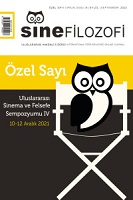“Herkesin Kutusu” Christopher Nolan Sinemasında Öznel Bilgi Meselesi
“Everyone’s Box”; The Problem Of Subjective Knowledge in the Films of Christopher Nolan
Author(s): Ridade ÖztürkSubject(s): Epistemology, Aesthetics, Film / Cinema / Cinematography, Sociology of Art
Published by: Serdar Öztürk
Keywords: Subjective knowledge; Memento; Following; the beetle in a box; Wittgenstein; Christopher Nolan;
Summary/Abstract: “Do we perceive the world as it is or does our personal experience shape our perception of the world?” is an important question in philosophy. A fundamental philosophical problem is whether the subjective experience can be accepted as a form of knowledge for epistemological justification. Two films written and directed by Christopher Nolan; Following (1998) and Memento (2000) can be viewed as presenting a commentary on the relationship of epistemological knowledge to subjective experience. Memento presents a character who has an extremely short-term memory and therefore constantly loses all the inventory accumulated by his personal experience. He is deprived of any means for self-knowledge from subjective experience and therefore, according to Nolan, he cannot know epistemological value regarding his exterior world. In the Following, Nolan proposes that a person’s subjective experience is a very important form of knowledge for getting to know that person. The characters in the film go into other people’s houses to experience their lives and therefore get to know who they are. The characters try to access their most personal belongings which they hide from others and therefore which most symbolize such experience. In the film, this idea is presented as “everyone has a personal box”. This brings an opening for Wittgenstein’s “beetle in a box” argument and the notion of “qualia” to be included in this discussion. These notions refer to the nature of subjective experience as well as allowing for new questions of epistemological inquiry on this relationship. Building upon this context, this article will present a philosophical discussion of Nolan’s view on subjective experience and his suggestion that epistemological knowledge depends upon subjective experience.
Journal: SineFilozofi
- Issue Year: 7/2022
- Issue No: Sp. Iss.
- Page Range: 155-167
- Page Count: 13
- Language: Turkish

